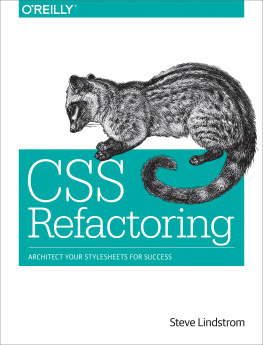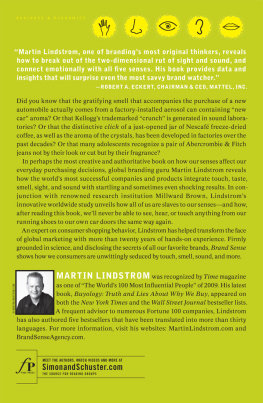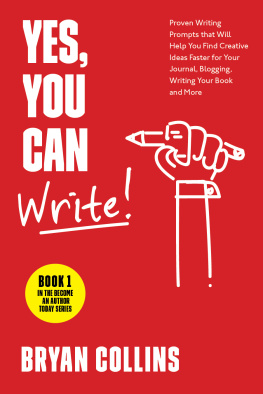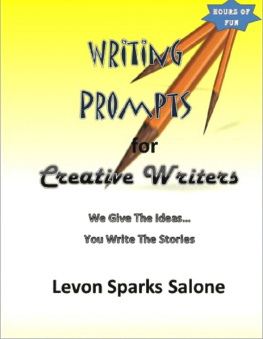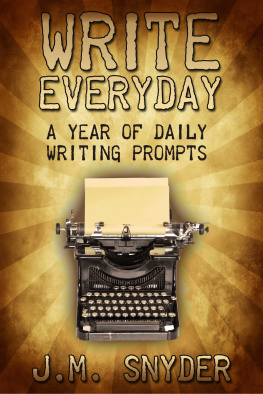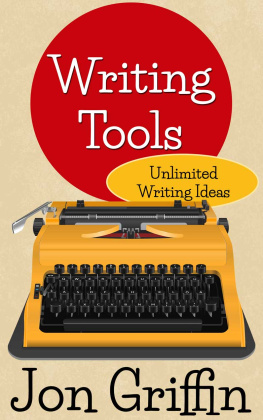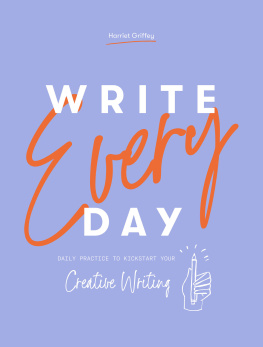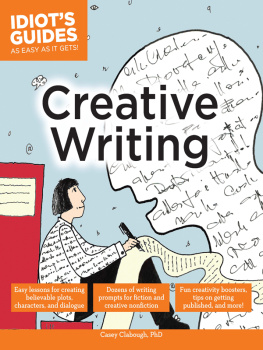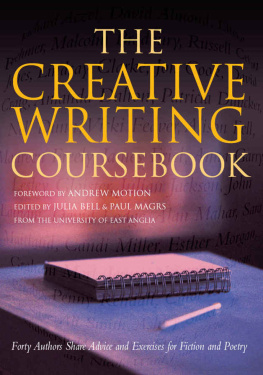C reative W riting
- From Think to Ink
Learn How to Unleash Your Creative Self and Discover Why You Dont Need 1000 Writing Prompts to Blast Away Your Writers Block and Improve Your Writing Skills
Table Of Contents
Introduction: What is Creativity Anyway, and Why Create at all?
- How to find that Big Why
Chapter 1: Desire the Root of Creativity
Chapter 2: Having the Guts to Say Something
Chapter 3: Finding Your Own Style and Voice
- Daily Exercises
Chapter 4: Being a Writer 24/7
Chapter 5: Pride, Ego and Growth
Chapter 6: Your Writing Workshop and Essential Hardware
- Concentration
- Comfort
Chapter 7: Setting up a Writing Community
- Writing Groups
- Writing Mentor
- Online Groups
Chapter 8: Give Your Writing a Heart
- Compelling Writing That Will Connect You With Your Readers
Chapter 9: The Writing Habit
Chapter 10: Writers Block and Why You Should Love it
- Ask Yourself This Next Time You Hit Writers Block
Chapter 11: Writing Myths
- Im not talented enough to be a writer
- Im just going to work on this piece until its finished and perfect
- Only crappy, lowest-common-denominator, poor quality stuff becomes popular, so why bother with working my masterpiece when Ill never make money from it?
- Im a writer. I dont know about the marketing side of things and I dont want to. If I create a good book, people will come. Eventually. Probably.
- Im not unique enough!
Chapter 12: More Nuts and Bolts: Creativity Exercises
- Exercise 1 "Shit Happens"
- Exercise 2 "People are Multitudes"
- Exercise 3 "Translations"
- Exercise 4 "Dalis trick"
- Exercise 5 "As Good as a Holiday"
Chapter 13: Effective vs. Ineffective Writing
- Procrastination
- Perfectionism
- Disorganization
Chapter 14: Writing Strategies That Work
- Maintaining Focus While Writing
- Boosting Productivity
- Fine Tuning Your Time Management
- Dealing With a Lull in Motivation
Chapter 15: The Editing Process
- Write Fat, Edit Lean
- Write Lean, then Plump It Up
- 17 Editing Questions To Ask
Chapter 16: Writing Blunders
- 20 Writing Blunders You Definitely Want To Avoid
Chapter 17: A Step-by-step Process for Handling Rejection With Grace
- Step One: Dont React Immediately
- Step Two: Evaluate the Criticism
- Step Three: Adjust and Repeat
- 8 Things To Remember When Youre Feeling Rejected
Chapter 18: What About a Ghostwriter?
Chapter 19: Launching Your Work
- Will You Self Publish At All?
- How Will You Cultivate An Online Presence?
- Who Is Your Audience, And How Can You Connect With Them?
- What Is Your Brand?
- How Will You Price Your Work?
- What Can You Do Consistently To Maintain Your Marketing Campaign?
Conclusion
Additional Writing Resources
Preview Of Other Books By This Author
- Self-Compassion
- How To Stop Worrying and Start Living
- The Minimalist Budget
- Love Is A Verb
- Codependency
- Mindful Eating
- Minimalism
- Self-Esteem For Kids
Copyright 2015 by Simeon Lindstrom - All rights reserved.
This document is geared towards providing exact and reliable information in regards to the topic and issue covered. The publication is sold with the idea that the publisher is not required to render accounting, officially permitted, or otherwise, qualified services. If advice is necessary, legal or professional, a practiced individual in the profession should be ordered.
- From a Declaration of Principles which was accepted and approved equally by a Committee of the American Bar Association and a Committee of Publishers and Associations.
In no way is it legal to reproduce, duplicate, or transmit any part of this document in either electronic means or in printed format. Recording of this publication is strictly prohibited and any storage of this document is not allowed unless with written permission from the publisher. All rights reserved. The information provided herein is stated to be truthful and consistent, in that any liability, in terms of inattention or otherwise, by any usage or abuse of any policies, processes, or directions contained within is the solitary and utter responsibility of the recipient reader.
Under no circumstances will any legal responsibility or blame be held against the publisher for any reparation, damages, or monetary loss due to the information herein, either directly or indirectly. Respective authors own all copyrights not held by the publisher.
The information herein is offered for informational purposes solely, and is universal as so. The presentation of the information is without contract or any type of guarantee assurance. The trademarks that are used are without any consent, and the publication of the trademark is without permission or backing by the trademark owner. All trademarks and brands within this book are for clarifying purposes only and are the owned by the owners themselves, not affiliated with this document.
Introduction: What is Creativity Anyway, and Why Create at all?
When you were a tiny baby, your head was full of mostly nothing and the world was new and unknown. You barely had the skill to move yourself around the environment, and you most definitely lacked the skill to do what humans are most know for communication.
As you grew and developed, though, something strange started to happen. The people around you, the things in your world - you began to understand that they could be reached . That in your infant isolation there was still a way to reach out and touch someone elses experience. You saw all around you evidence of this magical skill that you had yet to develop: language.
Almost every infant learns to talk, and many believe that impulse comes from this original yearning to reach out and connect, to speak and be heard, to breach the abyss between one and the other.
At the root of all creative expression is a deep, inborn and very human desire to be heard.
Since before we were old enough to understand it, weve tried to master this almost god-like ability to shape symbols and concepts, reach into the mind of someone else and affect their hearts and minds, to bring about changes in the world, to connect and understand and share with another human being.
I believe that its at this early stage that writers are born. Children gradually learn that some words are more correct than others, that some have greater effect, that some words get you into trouble and some words bring you closer to what you want. And when you eventually developed a sense of identity, you realized that words are the special tool that allows you to speak your mind, to make your desires known.
Language is a window into the soul.
For the writers among us, the urge to communicate more clearly, more beautifully, and in new ways never really left us. With the right words, new worlds can be created, new ideas can be incubated and grown, great heights and depths can be reached. Every brilliant idea had its first home in the written or spoken word, and if you are a writer or aspire to be one, you most likely understand this power better than anything.
So, why write?
Why be creative at all?
Creativity is perhaps the most uniquely human characteristic, and its no exaggeration that many have linked it to the divine. Creativity is the ability to look out over the vista of reality, and have the courage to wonder, what if this was some other way?
All change and growth begins with the creativity of imagining something different. In this book, well be talking about writing specifically, but creativity isnt fussy, and its quite likely that opening the door on your innate creativity will invite all sorts of new skills and insights into your life, not just the verbal ones.


